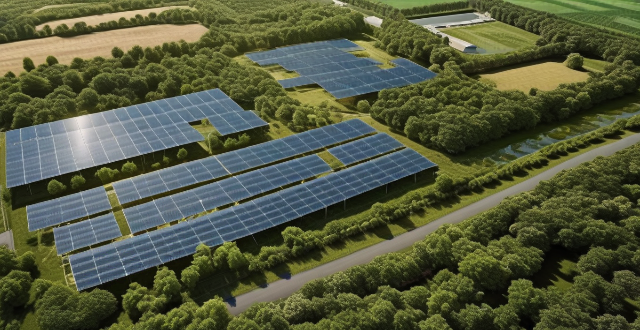Solar power generation involves converting sunlight into electricity using solar panels, which are made up of photovoltaic cells. The process includes generating electricity, converting it from DC to AC, net metering, and battery storage. Solar power is a viable option for residential use due to its cost-effectiveness, energy independence, environmental benefits, increased property value, and technological advancements.

How Does Solar Power Generation Work?
Solar power generation is the process of converting sunlight into electricity using solar panels. Here's a step-by-step explanation of how it works:
1. Photovoltaic Cells: Solar panels are made up of photovoltaic (PV) cells, which are composed of semiconductor materials like silicon. When sunlight hits these cells, it causes electrons to be knocked loose from their atoms.
2. Electricity Generation: The loose electrons create an electric current as they flow through the semiconductor material. This current can then be captured and used as electricity.
3. DC to AC Conversion: The electricity generated by solar panels is direct current (DC), but most household appliances run on alternating current (AC). Therefore, an inverter is used to convert the DC electricity into AC electricity that can be used in homes and businesses.
4. Net Metering: In many areas, utility companies offer net metering agreements for residential solar systems. This means that any excess electricity generated by the solar panels is fed back into the grid, and the homeowner receives credit for this excess energy.
5. Battery Storage: Some solar systems also include battery storage, which allows homeowners to store excess energy generated during the day for use at night or during power outages.
Is Solar Power a Viable Option for Residential Use?
Yes, solar power is a viable option for residential use due to several reasons:
* Cost-Effectiveness: The cost of installing solar panels has significantly decreased over the years, making it more affordable for homeowners. Additionally, federal tax credits and state incentives can further reduce the upfront costs.
* Energy Independence: Solar power provides homeowners with a reliable source of energy that is not dependent on fossil fuels or utility companies. This can lead to long-term savings on energy bills.
* Environmental Benefits: Solar power is a clean and renewable source of energy that does not produce greenhouse gases or pollutants. By using solar power, homeowners can reduce their carbon footprint and contribute to a healthier environment.
* Increased Property Value: Homes equipped with solar panels generally have higher property values than those without them. This makes solar power an attractive investment for homeowners looking to increase the value of their property.
* Technological Advancements: Advances in solar technology have made solar panels more efficient and durable than ever before. This means that homeowners can expect their solar systems to last for decades with minimal maintenance required.
In conclusion, solar power generation is a reliable and sustainable source of energy that is becoming increasingly popular among homeowners due to its numerous benefits. As technology continues to improve and costs continue to decrease, it is likely that even more people will choose to harness the power of the sun for their energy needs.